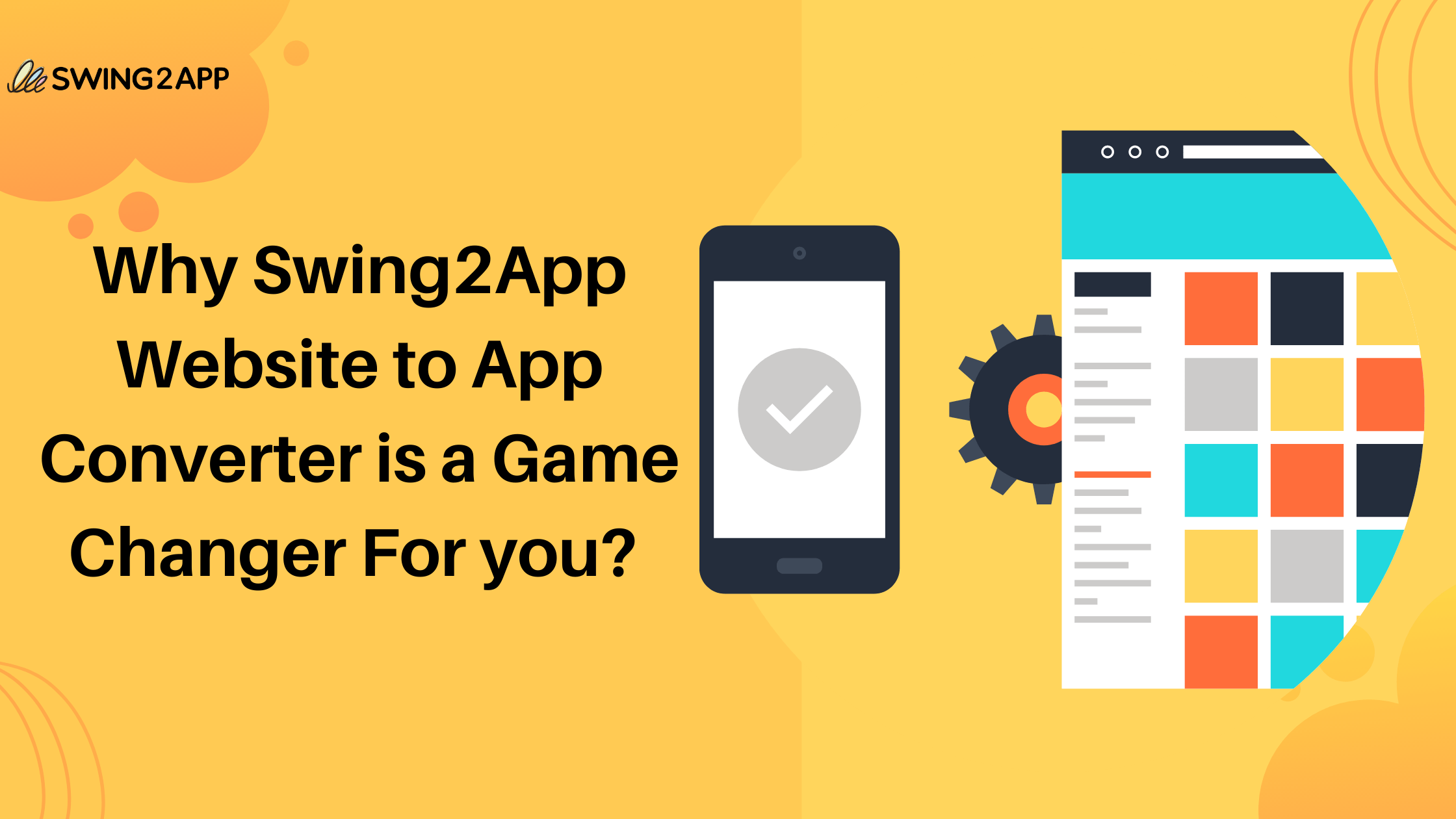Could you picture the Internet environment today without mobile apps? Surely not. The increasing availability of low-cost smartphone devices and lower-cost Internet has increased the demand for mobile apps. According to statistics, 82 percent of users prefer a mobile app over a web-based digital product.
Thus, the demand for mobile app development has exceeded expectations, and the trend continues. As a result, many small and medium businesses have jumped at the chance to grow into new markets. In countries with significant Internet usage, such as China and India, most people still use smartphones to access the Internet.
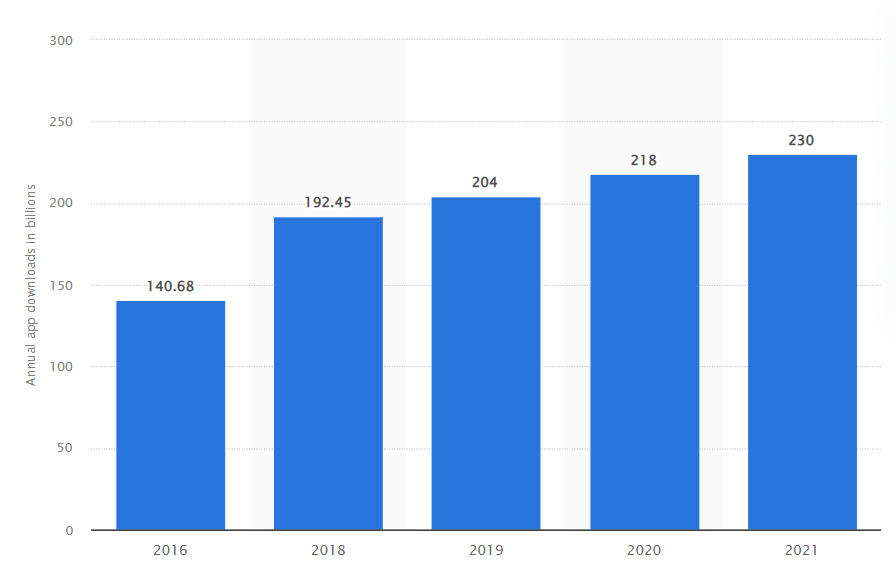
A mobile application allows you to interact with your customers and audience on the go – on their mobile devices.
How great would it be if you could have both a mobile app and a website for a fraction of the cost!
However, many businesses struggle to grasp the nuances of how to convert a website into an app. But don’t worry, it’s not as complicated as it appears. Your website may also be turned into an entertaining app that works on both iOS and Android with the correct technical help.
Why should you convert a website into an app? What are the biggest challenges? How can you convert a website to an app in the fastest, most cost-effective way?
This article provides answers to these questions and more. We’ll show you why converting a website to an app is a challenging process in the past, and why it’s still worthwhile now. We’ll go over the many possibilities for completing the task – and why Swing2App could be the best solution for you.
We’ll teach you how to use our platform, Swing2App, to convert any website into an app step by step near the conclusion.
Reasons: to convert your website into an app
Among the many reasons to convert a website into an app, the strongest is that you can’t carry your PC everywhere. Additionally, the site is designed to strike a balance between the phone and the computer. Therefore, we need a platform dedicated exclusively to smartphone users.
While a website or web app is best for desktop users, organic traffic, and serving new or first-time users, mobile applications are best for increasing and servicing your existing consumers. Let’s look at some more compelling reasons why you should consider turning your website into an app:
Portability
Because Android apps are written in Java, they can be transferred to any other mobile platform. Even better, an Android app can be ported to Chrome OS! Because of its flexibility, Android app development is highly profitable.
Moreover, it’s convenient to take your phone out of your pocket and place an order on an e-commerce website right away. Today the functionalities of mobile phones go broadly in line with computers. They’re also lightweight. So, why wouldn’t your customer choose an app over a website?
Personalized Experience
When you use your phone to access digital content or surf the web, it’s a quite unique experience from using a computer. Touch offers a more vivid connection with the audience than a website. Additionally, mobile apps can also be easily customized to meet users’ needs.
Push Notifications
One of the most significant advantages of converting a website into an app is being able to send push notifications. While push alerts may be sent from a website, they are restricted. You could send notifications to everyone who has the app installed, regardless of their operating system. Users can receive updates about new material, exclusive deals, and particular information such as shipment updates, and announcements.
Offline Features
Offline functionality is a significant factor in converting a website into an app. Although mobile applications require internet access to conduct most of their functions, they may nevertheless provide basic information and functionality when used offline. Allowing customers to view app information offline can help you keep their attention and build a long-term relationship. Compared to their web counterparts, offline components are significantly easier to include in an app. Converting a website into a mobile app, especially one that requires regular access and retains information, allows users to access it more readily even while they are offline.
Enhanced Revenue
When you turn a website into a mobile app, you’re laying the groundwork for a potentially lucrative income stream for your company. You can earn from your app in several direct and indirect ways.
1. In-app ads
2. Subscription plans
3. In-app purchases
4. Selling your product- eCommerce
5. Sponsorship
6. Referral marketing
7. Collecting and selling data and much more.
An AppStore / PlayStore Presence
A store presence is in itself a benefit. As well as making you appear more professional and established in the eyes of potential users, partners, and investors, it may also serve as a new user acquisition channel. To rank well for important search terms associated with your brand, good App Store optimization is crucial.
Swing2App makes the often-challenging process of getting approved and published on the App Stores quickly and easy. We handle everything for you, including handling Appstore and PlayStore directly!
Which Kind of App Should You Convert Your Website Into? Native vs. Hybrid:
Native App Development: It is the ideal option if your business demands an application with high performance and unique functionality. Experienced development services are required while developing apps for Android and iOS. Android development necessitates the use of Java and Kotlin, whereas iOS development necessitates the use of Objective-C and the Swift programming language.
The Benefits of Native App Development include:
- A customized approach for a certain company.
- App performance is at its best when there is a lot of traffic.
- Better Security
Native app development has a few drawbacks, including the need for more time and money. Furthermore, when compared to all other development methodologies, a native app gives the finest user experience.
Hybrid App: Developing and maintaining the same program for different operating systems takes more time and money. This becomes much more of an issue if you have a limited budget. You may easily convert your website to Android and iOS apps with Hybrid App Development solutions. Hybrid apps can be built using any of the two frameworks listed below, depending on the business requirements.
Hybrid and web innovations have advanced significantly in the last few years, and if you want to turn your website into application with comparable functionality and make a strong hybrid app, this is no longer a problem. However, customization costs may vary depending upon the complexities.
The pros and cons of east app development are summarised below:
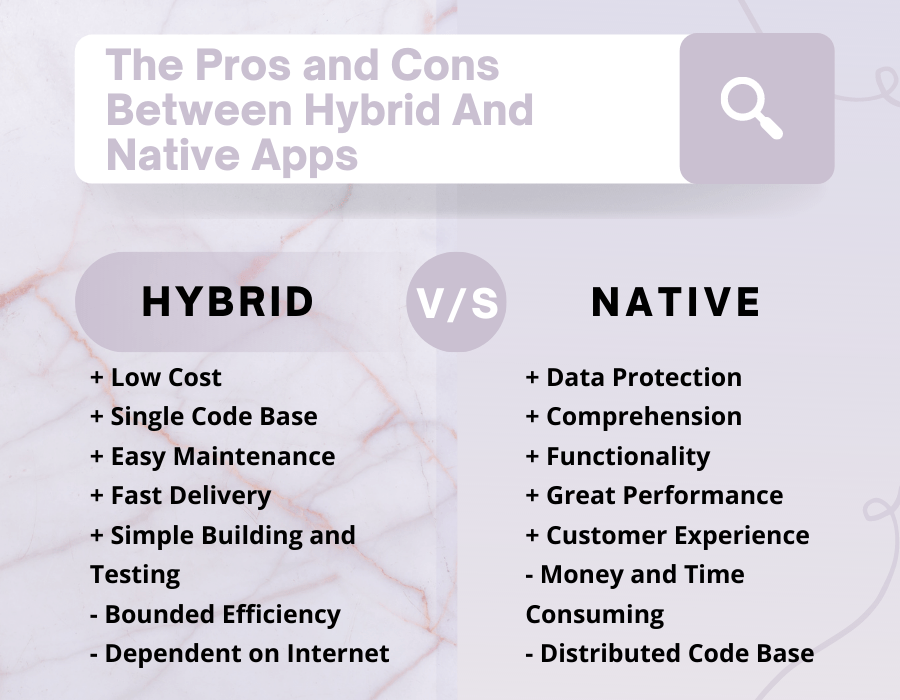
Should you make a native or hybrid app out of your website?
The answer is hybrid mobile apps. Native apps are great, but there is nothing distinctive about them in this scenario that justifies exponentially greater financial and time expenses. Hybrid apps have costs as well, although they are often much less expensive and have a shorter time to market.
Native would be the way to go if you were a well-funded digital start-up with a complicated platform and an app-first product strategy. Hybrid makes significantly more sense if you already have a core platform and want to transform your website into an app.
Many prominent IT companies have followed suit. Quora’s iOS and Android applications are hybrid, and many other apps, like Amazon, Facebook, LinkedIn, Slack, Gmail, and others, rely on online views today or in the past. Why? They followed the fast and successful way to the app stores since they already had the basic platform on the web.
Now that we have covered all of this, let’s look at how to turn your website into an app.
How to create an app for your website?
There are 5 basic ways to create an app for your website. To make it easier for you to comprehend, we have presented them in a table.
| Pros | Cons | Cost and Time | |
| Code it yourself | 1.High customization scope 2.can leverage your core web product 3.No time wasted on explaining to others 4.Full rights of your code are with you 5.Easy Multiple revisions possible 6.self project management | 1.Highly time consuming 2.Can impact revenue as you will need a team 3.Need to learn to code (React Native, JavaScript, etc.) 4.Double work (iOS + Android) 5.App publishing difficulties may arise 6.App maintenance & testing is also your responsibility. | From app designing to publishing it could take at least 6 months or more and could cost you depending upon your team size |
| Hire a freelancer | 1.you & your team can focus elsewhere 2.much cheaper than hiring an agency or building an internal team 3.skilled person creates your app which could produce better results | 1.significant costs as it requires testing and a lot of research, which takes time. 2.You must ensure they have the skills, portfolio, and references 3.Freelancer must be onboarded on your business which can be risky 4.Communication is a big issue here -multiple revisions may cost you more 5.chances of late project completion is quite high | It’s not always time efficient to hire a freelancer and get projects done when you want or need unless they’ve signed a legally binding contract. If you take a browse Upwork, the freelancer charge from $30- $250 per hour or even more as per their skills and experience. |
| Hire an agency | 1.Your team is free to focus elsewhere 2.they guarantee professional results 3.they know best app UI and UX practices 4.They will conduct deep research into your target audience and competition 5.Project management is fairly good | 1.Their fees are too high for a startup. 2.much longer development time 3.strict terms and limitations, so even slight changes may be very costly | Development time varies with the complexity of app but takes at least 2-3 months. The average cost of an app is between $40,000 and $80,000; and it gets doubled for Native Apps. |
| DIY App builders like Swing2App | 1.You can do it yourself without learning to code 2.For a small business, it is quite cost effective. 3.Time efficient | 1.Customization requires extra expenses 3.Limited themes might be an issue | In less than a month, you can create and release your app. |
Why Swing2App and how to use it?
Swing2App is a no-code DIY App creating platform where anyone can create an app easily. It has all the benefits mentioned in the above table; but that’s not it, there is much more! It makes the app creation process as easy as walking in a park. We are the futuristic way of app creation, as you must know no code is the future. With us, by saving costs and time you also gain many additional advantages.
Swing2App is a point solution for all your app development problems. The additional benefits provided by Swing2App are:
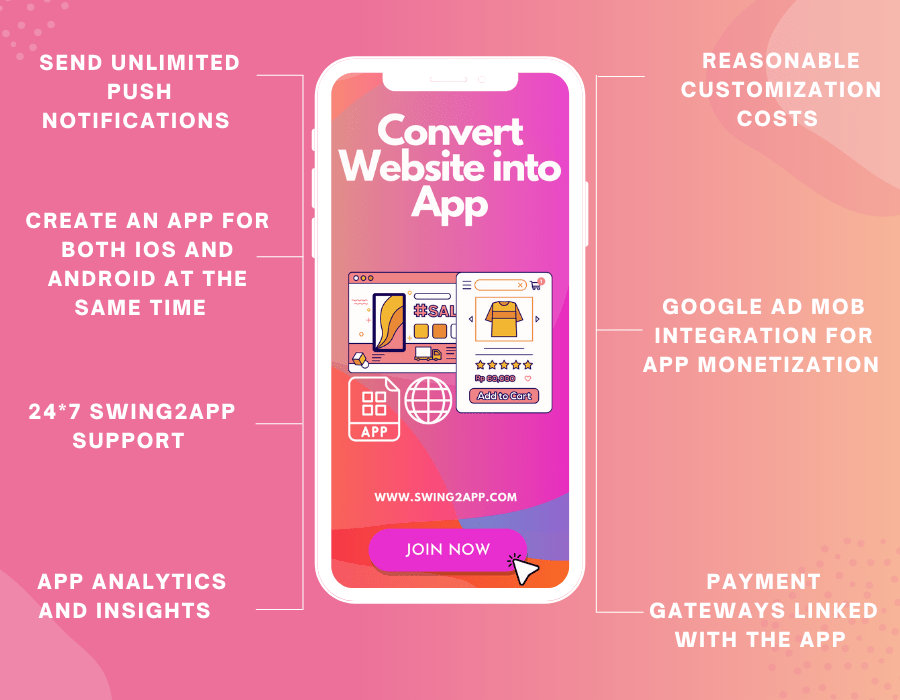
1. Create an app for both iOS and Android at the same time
2. Send unlimited push notifications
3. 24*7 Swing2App support
4. Reasonable customization costs
5. Google Ad Mob integration for app monetization
6. App analytics and insights
7. Payment gateways linked with the app
With Swing2App, you can create a no-code WebView app for free and then pay only when you are ready to upload it to the Appstore or PlayStore. The best part is that you can turn any website into an App; be it a blog website on WordPress or an e-Commerce website on Shopify or WooCommerce, and that too without any coding at all.
Now let’s briefly discuss the 3 simple steps to convert your website into an app in just 5 minutes with Swing2App.
1. App Basics:
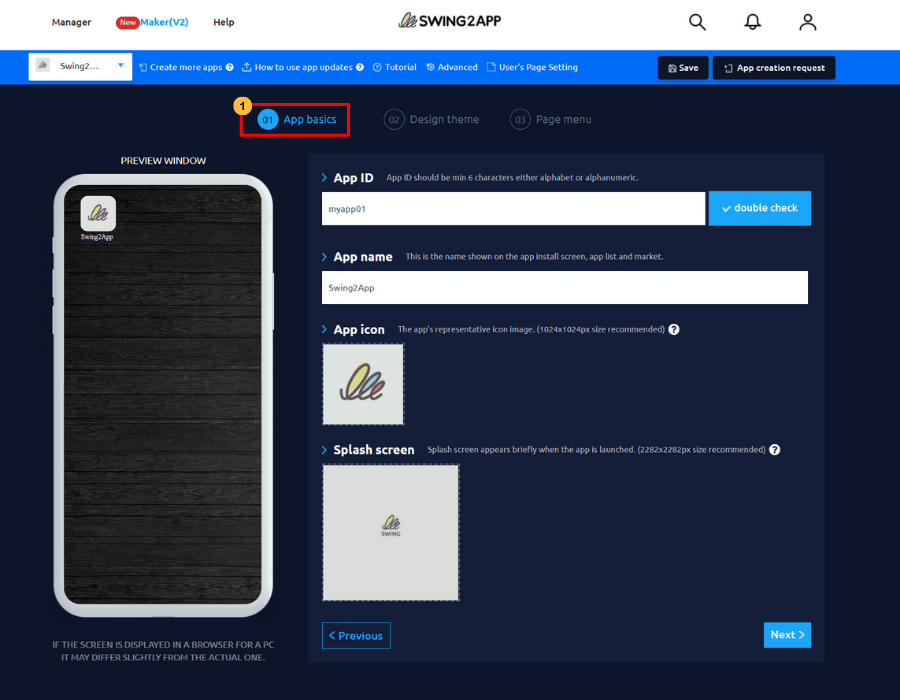
-Generate your app id.
-Name your app- You can enter your business name for your app.
Insert for the app icon and Splash screen
In web view only you can simply convert your existing website into an app, your app will look and work exactly the same as the website.
However, if you wish to send push notifications in your app too, Swing2app also provides one-signal integration with this, so that you can send and manage your push notifications conveniently. Earlier if a user wanted to convert their website to an app and wanted to send push notifications to users then they had to make a Push-only prototype of apps only but now the WebView prototype app users can also send and receive unlimited push notifications with the simple integration of One Signal with Swing2App.
2. Design theme
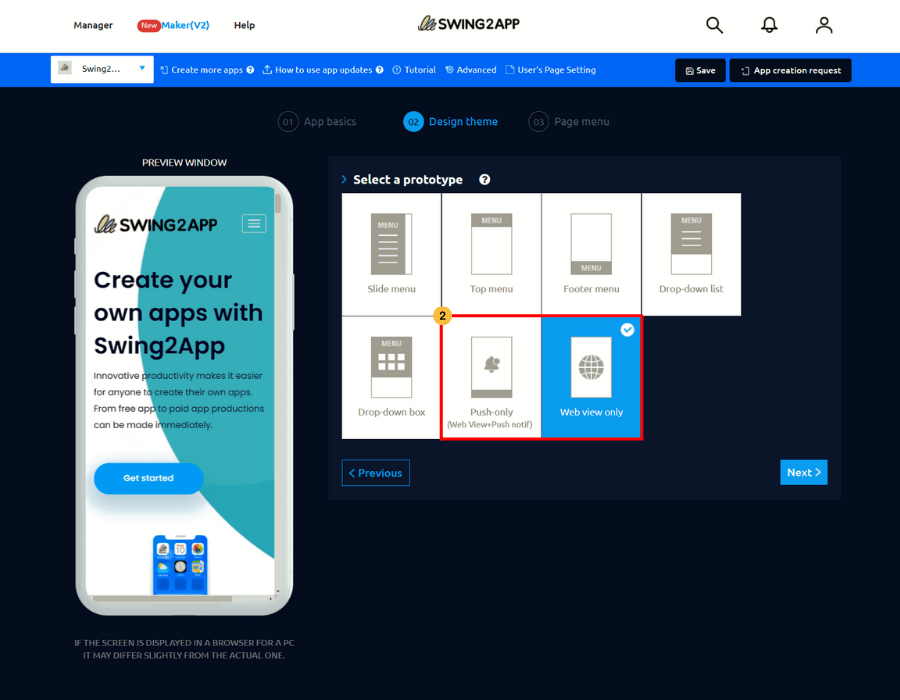
Customize and convert your website into an app with just a few clicks.
-Select a prototype for your app; Swing2App provides 2 prototypes for WebView apps:
- WebView only
- Push only
In web view only you can simply convert your existing website into an app, your app will look and work exactly the same as the website.
However, if you wish to send push notifications in your app too, Swing2app also provides one-signal integration with this, so that you can send and manage your push notifications conveniently. Earlier if a user wanted to convert their website to an app and wanted to send push notifications to users then they had to make a Push-only prototype of apps only but now the WebView prototype app users can also send and receive unlimited push notifications with the simple integration of One Signal with Swing2App.
-Select theme colours, design, and background
3. Page menu
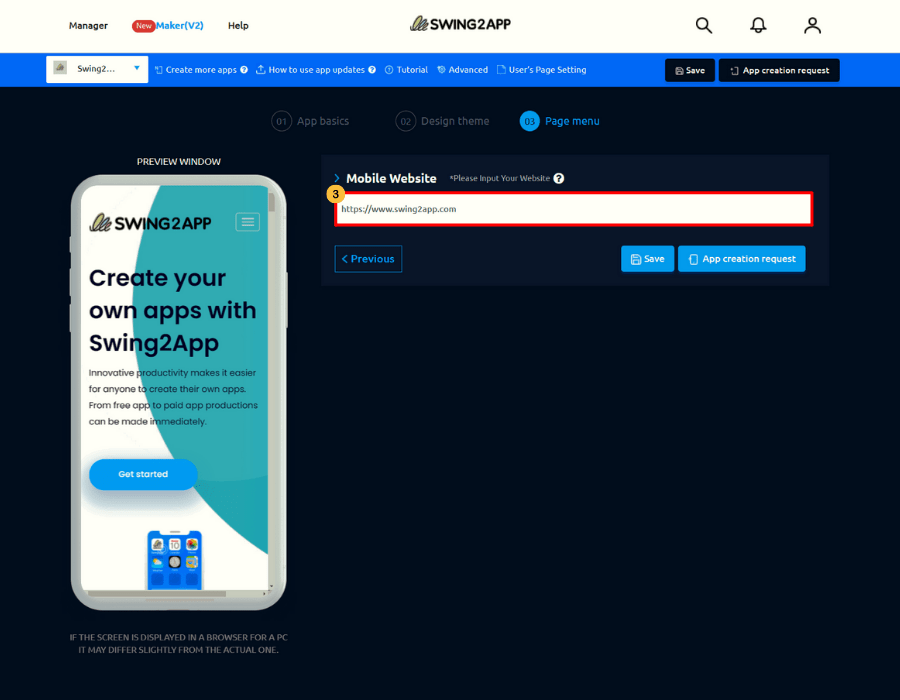
Enter your website URL and click on App creation request.
You can download this app on your android device and view it before publishing it.
Publish your app in Play Store and Apple App Store to expand your audience with your app.
To sum up
If you already have a website and you wish to convert it into an app, the choice should be Swing2App. Our opinion may be biased, but we believe Swing2app is the most cost-effective and successful option to convert a website to an app, and we’ve shown you plenty of reasons to believe us.
